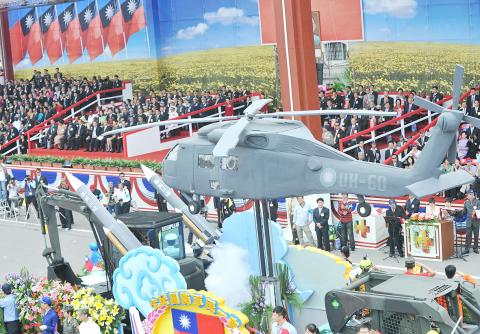Sikorsky Aircraft Corp was awarded a US$48.6 million firm-fixed-price contract for the procurement of four “green” UH-60M Black Hawk helicopters to Taiwan, the US Department of Defense announced last week.
Work will be performed at the Sikorsky plant in Stratford, Connecticut, with an estimated -completion date of May 30, 2013, said the release, issued on Thursday.
The four “green” helicopters — a term referring to initial assembly of a standard platform before customer add-ons are requested — are part of the 60 Black Hawk utility helicopters included in the US$6.4 billion Foreign Military Sale (FMS) notified to US Congress in January last year.

PHOTO: AFP
The estimated total cost for all 60 helicopters is US$3.1 billion.
The package includes a request for radar warning receivers, infrared countermeasure sets, missile-warning systems, laser-detecting sets, spare engines, machine gun systems, aviator night vision goggles and communication/data link systems for Taiwan’s “Po-Sheng” C4ISR (command, control, communications, computers, intelligence, surveillance and -reconnaissance) architecture.
Once integrated into the armed forces, the Black Hawks will replace its aging fleet of UH-1H Huey helicopters and serve a series of functions, including personnel movement, cargo lifting and medical evacuation, as well as defense of vital installations and close air support for ground forces.
The UH-60M is the US Army’s primary multi-mission helicopter.

The manufacture of the remaining 28 M1A2T Abrams tanks Taiwan purchased from the US has recently been completed, and they are expected to be delivered within the next one to two months, a source said yesterday. The Ministry of National Defense is arranging cargo ships to transport the tanks to Taiwan as soon as possible, said the source, who is familiar with the matter. The estimated arrival time ranges from late this month to early next month, the source said. The 28 Abrams tanks make up the third and final batch of a total of 108 tanks, valued at about NT$40.5 billion

A group from the Taiwanese Designers in Australia association yesterday represented Taiwan at the Midsumma Pride March in Melbourne. The march, held in the St. Kilda suburb, is the city’s largest LGBTQIA+ parade and the flagship event of the annual Midsumma Festival. It attracted more than 45,000 spectators who supported the 400 groups and 10,000 marchers that participated this year, the association said. Taiwanese Designers said they organized a team to march for Taiwan this year, joining politicians, government agencies, professionals and community organizations in showing support for LGBTQIA+ people and diverse communities. As the first country in Asia to legalize same-sex

Travel agencies in Taiwan are working to secure alternative flights for travelers bound for New Zealand for the Lunar New Year holiday, as Air New Zealand workers are set to strike next week. The airline said that it has confirmed that the planned industrial action by its international wide-body cabin crew would go ahead on Thursday and Friday next week. While the Auckland-based carrier pledged to take reasonable measures to mitigate the impact of the workers’ strike, an Air New Zealand flight arriving at Taipei from Auckland on Thursday and another flight departing from Taipei for Auckland on Saturday would have to

MOTIVES QUESTIONED The PLA considers Xi’s policies toward Taiwan to be driven by personal considerations rather than military assessment, the Epoch Times reports Chinese President Xi Jinping’s (習近平) latest purge of the Chinese People’s Liberation Army (PLA) leadership might have been prompted by the military’s opposition to plans of invading Taiwan, the Epoch Times said. The Chinese military opposes waging war against Taiwan by a large consensus, putting it at odds with Xi’s vision, the Falun Gong-affiliated daily said in a report on Thursday, citing anonymous sources with insight into the PLA’s inner workings. The opposition is not the opinion of a few generals, but a widely shared view among the PLA cadre, the Epoch Times cited them as saying. “Chinese forces know full well that